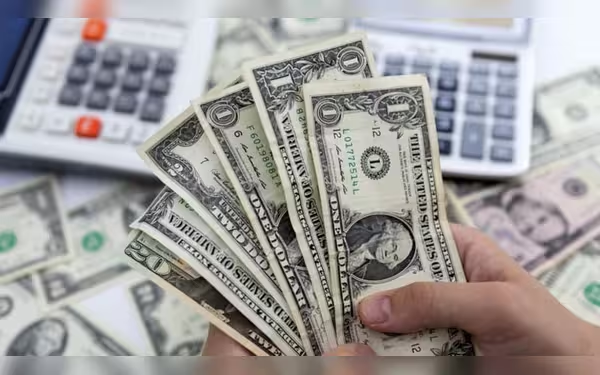Thursday, November 21, 2024 06:21 AM
Dollar Declines as 'Trump Trade' Momentum Fades
- Dollar hits one-week low amid policy uncertainty.
- Japanese yen falls as safe-haven demand decreases.
- Market awaits key appointments in Trump's administration.
 Image Credits: channelnewsasia
Image Credits: channelnewsasiaThe U.S. dollar declines as 'Trump Trade' momentum wanes, with market awaiting key policy details and appointments.
The U.S. dollar has recently experienced fluctuations, particularly after the election of President-elect Donald Trump. Following a three-day decline, the dollar made a comeback on Wednesday, as investors eagerly awaited more information regarding Trump's proposed policies. Meanwhile, the Japanese yen, which is often seen as a safe-haven currency, fell as the demand for safety diminished.
On the previous day, the dollar and other safe-haven currencies like the yen had gained due to geopolitical concerns. However, this boost was short-lived. Russia's foreign minister reassured that the country would "do everything possible" to prevent nuclear war, which eased some of the fears surrounding the ongoing Russia-Ukraine conflict. Jane Foley, an expert in foreign exchange strategy, noted that while the fears have subsided, the market remains sensitive to any new developments.
The Japanese yen dropped to 155.815 against the dollar, reversing the gains it had made earlier. This decline raised concerns about a potential shift in the Bank of Japan's policies, especially as the yen approached levels that previously prompted government intervention. Foley pointed out that the 155 level is critical, as it could trigger nervousness in the markets regarding intervention. If verbal interventions are effective in stabilizing the currency, the Japanese finance ministry may hold off on actual interventions for the time being.
The dollar index, which compares the dollar to six major currencies, rose by 0.5 percent to 106.59, recovering from its earlier decline. Last week, the index reached a one-year high of 107.07, driven by expectations of significant fiscal spending and tighter immigration policies under the incoming administration. Economists believe these measures could lead to inflation and potentially slow down the Federal Reserve's easing policies.
Foley mentioned that the market might be in a consolidation phase until early January when Trump officially takes office and more details about his policies are revealed. Investors are particularly keen to see who Trump will appoint as Treasury Secretary, a key position that oversees the nation’s financial policies. Some of Trump's other cabinet picks have raised eyebrows due to their limited experience in relevant fields.
According to strategists at DBS, the "Trump Trade," which had previously bolstered the dollar, is now facing challenges due to the controversial cabinet nominations and the ongoing tensions in the Russia-Ukraine conflict. However, they believe that in the long run, the dollar's performance will be more influenced by solid economic data and the likelihood that the Federal Reserve may need to slow its rate cuts in 2025.
Traders are adjusting their expectations for an interest rate cut at the Fed's upcoming meeting in December, with the probability now at 55.5 percent, a significant drop from 82.5 percent just a week ago. In the UK, the British pound received a temporary boost after data showed a stronger-than-expected rise in consumer inflation, suggesting that the Bank of England will proceed with caution regarding interest rate changes.
The euro also saw a slight decline, dipping 0.4 percent to $1.0559, while Bitcoin hovered near its all-time high of over $94,000. This surge in Bitcoin's value is attributed to expectations of a more favorable regulatory environment for cryptocurrencies under Trump's administration. Reports indicate that Trump's social media company is in discussions to acquire a cryptocurrency trading firm, which has further fueled optimism for a cryptocurrency-friendly regime.
The current state of the dollar and other currencies reflects a complex interplay of political developments and economic indicators. As investors navigate these changes, it is crucial to stay informed about the evolving landscape, particularly as new policies emerge under the incoming administration. Understanding these dynamics can help individuals and businesses make more informed financial decisions in the coming months.













